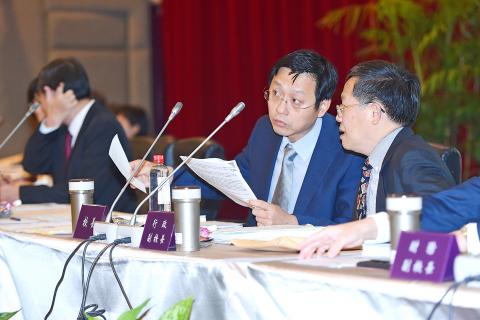The nation’s top academics are leaving the nation due to low wages and a worsening research environment, National Taiwan University (NTU) interim president Kuo Tei-wei (郭大維) said yesterday, warning against a possible collapse of the nation’s higher education system.
China’s Fujian Provincial Government Education Department has announced a plan to recruit 1,000 top Taiwanese academics to teach at its universities by 2020, a department report cited by the Chinese-language Xiamen News said on Friday.
The department intends to promote bilateral collaboration between Taiwan and China’s Fujian Province in certain disciplines and, long-term, to open universities, junior colleges and vocational schools in collaboration with Taiwanese academics, the report said.

Photo: Liao Chen-huei, Taipei Times
The department plans to recruit Taiwanese academics as part of its Fujian Pilot Free Trade Zone and other industrial development projects, it said.
Asked to comment on the plan after an NTU administration meeting in Taipei yesterday, Kuo said the nation’s higher education system would collapse if more academics left to teach in other countries.
More junior and senior lecturers could leave Taiwan because of relatively low wages for academics aged between 30 and 60, and the low pensions paid to retired academics, Kuo said.
While the average age of new NTU professors is 39, their pensions are only about half of their salaries, sometimes even lower than those of teachers at elementary and junior-high schools, he said.
Some NTU professors have already left for other countries, with others still weighing their options, he said, adding that the loss of top academics would lead to the departure of top students.
Under these circumstances, the nation’s higher education system could break down if the number of top-ranking universities continues to shrink, Kuo said.
Meanwhile, the Ministry of Education’s Yushan Project is to come into effect next year.
Under the program, professors would be able to earn up to 10 percent extra monthly in allowances.
The ministry also encourages universities to recruit top academics from overseas, who could then apply for research funding of up to NT$5 million (US$165,338) per person if their projects bear on the nation’s key development domains.
The ministry is to budget NT$5.6 billion per year for higher education, it said, adding that about 19,000 teachers could benefit from the project.
However, the Yushan Project is inadequate for top academics and the ministry should launch another project, perhaps named the “Alishan Project,” to improve the competitiveness of salaries and research grants, Kuo said.
Taiwan’s higher education system needs more exceptional and creative academics, he said, adding that not everyone with a doctorate is qualified to be a university professor.

AGING: As of last month, people aged 65 or older accounted for 20.06 percent of the total population and the number of couples who got married fell by 18,685 from 2024 Taiwan has surpassed South Korea as the country least willing to have children, with an annual crude birthrate of 4.62 per 1,000 people, Ministry of the Interior data showed yesterday. The nation was previously ranked the second-lowest country in terms of total fertility rate, or the average number of children a woman has in her lifetime. However, South Korea’s fertility rate began to recover from 2023, with total fertility rate rising from 0.72 and estimated to reach 0.82 to 0.85 by last year, and the crude birthrate projected at 6.7 per 1,000 people. Japan’s crude birthrate was projected to fall below six,

US President Donald Trump in an interview with the New York Times published on Thursday said that “it’s up to” Chinese President Xi Jinping (習近平) what China does on Taiwan, but that he would be “very unhappy” with a change in the “status quo.” “He [Xi] considers it to be a part of China, and that’s up to him what he’s going to be doing, but I’ve expressed to him that I would be very unhappy if he did that, and I don’t think he’ll do that. I hope he doesn’t do that,” Trump said. Trump made the comments in the context

SELF-DEFENSE: Tokyo has accelerated its spending goal and its defense minister said the nation needs to discuss whether it should develop nuclear-powered submarines China is ramping up objections to what it sees as Japan’s desire to acquire nuclear weapons, despite Tokyo’s longstanding renunciation of such arms, deepening another fissure in the two neighbors’ increasingly tense ties. In what appears to be a concerted effort, China’s foreign and defense ministries issued statements on Thursday condemning alleged remilitarism efforts by Tokyo. The remarks came as two of the country’s top think tanks jointly issued a 29-page report framing actions by “right-wing forces” in Japan as posing a “serious threat” to world peace. While that report did not define “right-wing forces,” the Chinese Ministry of Foreign Affairs was

PREPAREDNESS: Given the difficulty of importing ammunition during wartime, the Ministry of National Defense said it would prioritize ‘coproduction’ partnerships A newly formed unit of the Marine Corps tasked with land-based security operations has recently replaced its aging, domestically produced rifles with more advanced, US-made M4A1 rifles, a source said yesterday. The unnamed source familiar with the matter said the First Security Battalion of the Marine Corps’ Air Defense and Base Guard Group has replaced its older T65K2 rifles, which have been in service since the late 1980s, with the newly received M4A1s. The source did not say exactly when the upgrade took place or how many M4A1s were issued to the battalion. The confirmation came after Chinese-language media reported